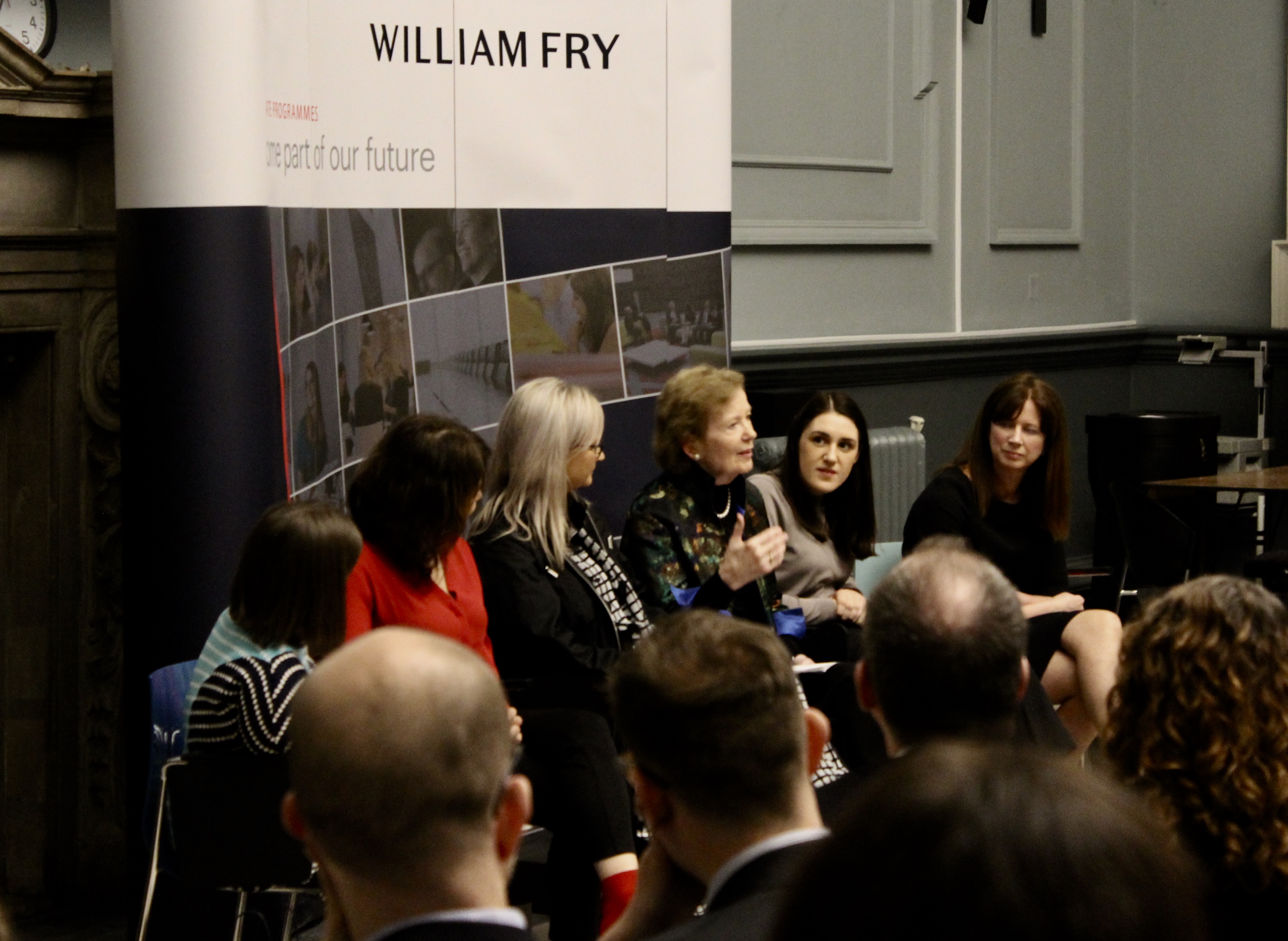In advance of International Women’s Day, Law Soc hosted a panel discussion last night on Women in Leadership in association with William Fry. The event aimed to examine what it is like to be a leading woman in 21st century Ireland with a panel discussion featuring some of the nation’s most prominent female figures. This conversation revolved around the struggles that each of the women have had to overcome to achieve success, with a particular focus on society’s ever-changing perception of women in leadership.
The event was chaired by the former LawSoc Auditor and the first female President of Ireland, Mary Robinson. As a renowned supporter of human rights, with experience as secretary-general of the World Conference against Racism, Racial Discrimination, Xenophobia and Related Intolerance, and as a founding member of the Council of Women World Leaders, Robinson was uniquely qualified to chair the event.
The panellists were from diverse backgrounds. Robinson was joined by Sinéad Burke, disability and fashion activist and contributing editor at Vogue, who has been a powerful and outspoken figure for accessibility in the fashion industry in particular, along with Irish actress, writer and comedian, Tara Flynn. The other panellists in attendance included Dee Forbes, the current Director-General of RTÉ and the first woman to hold the role, and Iseult Ward, who is the co-founder and CEO of the award-winning social enterprise FoodCloud, which donates surplus food directly to over 3,000 charities. The panel discussion was sponsored by the leading law firm William Fry, with Lisa Carty of William Fry’s Litigation and Dispute Resolution department filling the final seat on the panel.
Following a short delay, the event opened with a presentation of TCD Law Society’s Praeses Elite Award to each of the panellists, in recognition of their social, political and economic achievements. However, it is quite safe to say that those in attendance were willing to overlook Robinson’s tardiness seeing that, as she jokingly pointed out herself, Robinson has certainly done her “bit” for women over the years. Robinson opened the discussion with the issue of combatting perceptions in business and leadership. When the question was directed towards Burke, she emphasised the necessity of not taking “no” for an answer, and the need to distance yourself personally from rejection, which is inherent in the path to success. The importance of tenacity quickly established itself as the theme of the evening, with Flynn responding to the issue of how one may combat society’s perceptions by stressing the importance of being open to opportunities that may not necessarily be part of your dream plan.
The panellists were in agreement that passion and the ability to take risks were vital components in their success. The capacity to learn from failure arose several times, along with the modern trend among women today, particularly in the corporate world, who are prone to believing that the diminishment of overtly traditional feminine aspects of their personality and appearance is essential to success. Flynn admitted that early on in her career she fell into the trap of feeling she had to present herself as “one of the lads’’ as a means of gaining opportunities and furthering her career. Interestingly, Forbes expressed the opposite mentality, suggesting that in the male-dominated world of media, it was through harnessing her traditionally ‘‘feminine’’ attributes which better enabled her to progress in her field. However, as Burke pointed out, the concept of the feminine and the ‘‘female’’ encompasses an increasingly broad definition, which means different things to different people.
This discussion led naturally towards the importance of individuality and being true to oneself. For Burke, everything came back to the question of “what do you stand for?”. The concept of gender quotas in business and corporations was a particular bone of contention. Carty’s asserted that although the concept of merit is important, gender quotas are a ‘‘necessary evil’’ for the current climate, and this was met by more than a few assenting nods from the crowd. Where Carty discussed the complexity of gender quotas, Burke focused on the importance of representation, and the narrowness of the quotas. She raised the valid question as to what constitutes equality and the representation of people with disability, women of colour, and people of the traveller community, to name but a few under-represented members of society. As Burke put it, representation is vital among young individuals for the simple reason that: “if you can see it, you can be it.”
The final question posed to the panel was on who they viewed as role models. Carty immediately jumped in, rushing to answer that the event’s Chair was her role model. Robinson quickly followed this with a humorous quip that no one else was allowed to mention her name. Overall, the general sense given by the panellists was that their inspirations and role models stemmed from family, especially from the women they had grown up with and learned immensely from.
The event, which was followed by a networking reception, concluded with a final word by Robinson about her own sources of inspiration in her life. She similarly emphasised the role of the family, representation and the leading figures she encountered throughout her career. Robinson’s final words of advice to attendees were to keep in mind the strong power that humour, stories and self-deprecation can hold. A discussion on being taken seriously as women in modern society and leadership closed with the reminder to simultaneously not take yourself too seriously.






